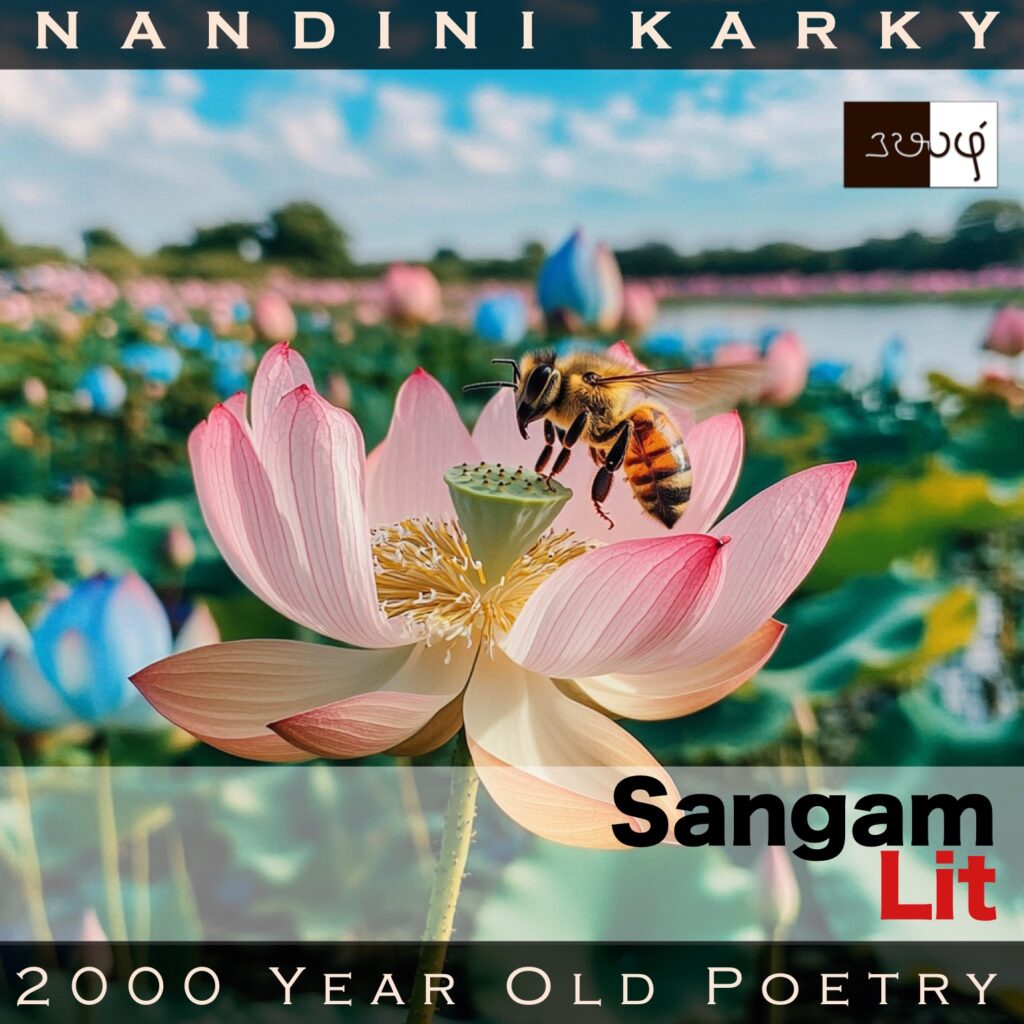Sangam Lit

Kalithogai 74 – Flower-hopping bee
In this episode, we listen to the sharp censure of the lady, as portrayed in Sangam Literary work, Kalithogai 74, penned by Maruthan Ilanaakanaar. The verse is situated in the ‘Marutham’ or ‘Farmlands landscape’ and vividly sketches the man’s infidelity.

பொய்கைப் பூ புதிது உண்ட வரி வண்டு கழி பூத்த
நெய்தல் தாது அமர்ந்து ஆடிப், பாசடைச் சேப்பினுள்
செய்து இயற்றியது போல வயல் பூத்த தாமரை
மை தபு கிளர் கொட்டை மாண் பதி படர்தரூஉம்,
கொய்குழை அகை காஞ்சித் துறை அணி நல் ஊர!
அன்பு இலன் அறன் இலன் எனப்படான் என ஏத்தி,
நின் புகழ் பல பாடும் பாணனும் ஏமுற்றான்;
நஞ்சு உயிர் செகுத்தலும் அறிந்து உண்டாங்கு அளி இன்மை
கண்டு நின் மொழி தேறும் பெண்டிரும் ஏமுற்றார்;
முன்பகல் தலைக்கூடி நன்பகல் அவள் நீத்துப்
பின்பகல் பிறர்த் தேரும் நெஞ்சமும் ஏமுற்றாய்;
என ஆங்கு,
கிண்கிணி மணித் தாரொடு ஒலித்து ஆர்ப்ப, ஒண்தொடிப்
பேர் அமர்க் கண்ணார்க்கும் படுவலை இது என,
ஊரவர் உடன் நகத் திரிதரும்
தேர் ஏமுற்றன்று நின்னினும் பெரிதே.
A rather crisp verse in this series of the lady bashing the man. The words can be translated as follows:
“Feeding on the fresh flowers in the pond, the striped bee journeys to the blue lotus blooming in the backwaters. After relishing the pollen of the blue lotus, it takes flight to rest on the glowing centre of a faultless and esteemed pink lotus bud with green leaves, blooming in the field, appearing like an etched sculpture, in the shores filled with Portia trees, which keep sprouting even as maidens pluck ceaselessly, in your picturesque, fine town, O lord!
Upholding you as one, whom no one can say, ‘He is without love, he is without fairness’, the bard who keeps singing your praises is senseless.
Akin to knowing fully well that it’s poison and still drinking it up, even after sensing your lack of grace, those women, who keep trusting your words, are senseless too.
Uniting with one in the forenoon, abandoning her at noon, and seeking another in the afternoon, that heart of yours is senseless too!
And so, resounding with strings of tinkling bells, as a net to trap maiden with shining bangles and big, pretty eyes, the chariot of yours that roams around, inviting the mockery of the townsfolk, is even more senseless than you!”
Let’s delve into the details. The verse is situated in the context of a love-quarrel between a man and a lady, owing to the man’s seeking of courtesans. These words are said by the lady to the man. The lady begins by describing a man’s town, and to do that, she trails behind a bee that was relishing the nectar of a flower in the pond, and then flies off to roll in the bed of pollen on a blue lotus, in the backwaters nearby. From there, it then journeys to the exquisite and radiant heart of a pink lotus growing in a field. Such is the lush land of the man’s town, with vibrant shores, where the Portia trees keep rendering their flowers, no matter how many are plucked away. Such praise for the man’s land but he’s not so lucky here! First, the man’s bard, who keeps singing the man’s praises, gets the brickbat, and the lady says he must be crazy to say that the man is so full of love and justice. Next hit are the courtesans the man courts and the lady calls them crazy for accepting the man, inspite of all his falsehoods, just the way someone would drink a thing, knowing fully well that it’s poison. Third in line to get knocked down is the man himself, for being with one woman in the morning, forsaking her at noon, and then searching for another in the afternoon. The lady concludes by sketching a picture of the man’s chariot as a vessel, which roams as a trap for beautiful maiden, inviting the ridicule of the town, and that is even crazier than the man! Starting from the scene of the bee jumping flower to flower, the lady clearly lays the groundwork for this portrait of her promiscuous man, telling the world that she cannot be fooled by his pretences of love!






 Visit Podcast Website
Visit Podcast Website RSS Podcast Feed
RSS Podcast Feed Subscribe
Subscribe
 Add to MyCast
Add to MyCast